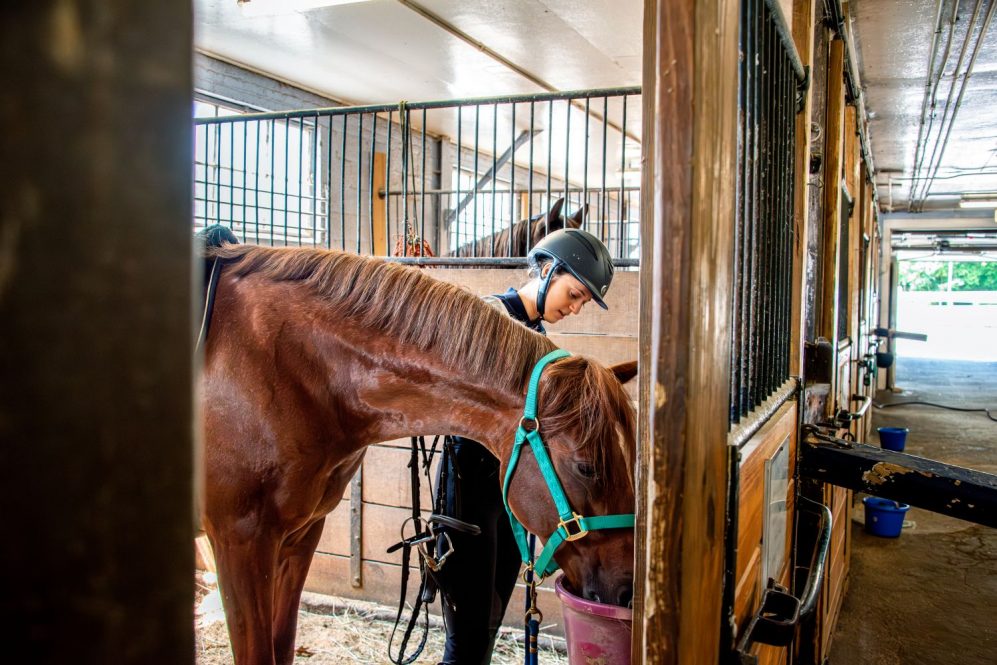A new study has found that horses with higher parasitic loads also have worse coat conditions, thanks to the development of a novel tool with far-reaching impacts.
This work was led by Jenifer Nadeau, associate professor of animal science in the College of Agriculture, Health and Natural Resources (CAHNR). It was published as an abstract in the Journal of Equine Veterinary Science.
The Hamilton-Zuk Hypothesis suggests an association between birds’ plumage and their parasitic load. The hypothesis states that birds with better, more attractive plumage have a lower parasitic load. Nadeau wanted to see if this association was also present in horses.
Essentially all horses have some parasites in their system because parasites live on grass, and horses graze as an essential part of their diets. At low levels, these parasites are generally harmless. However, if they cross a certain threshold they can cause health problems like damage to the liver, stomach, or intestines.
UConn regularly deworms its horses to prevent a buildup of parasites. Students assist with fecal analysis as part of the equine program’s emphasis on experiential learning. UConn recently announced a new Equine Science and Management major that will start accepting students in the fall of 2026.
“Even if it’s not detrimental at this point, it could be,” Nadeau says. “So, by being on top of it, we prevent it from being a problem later on for the animals.”
Nadeau and her students evaluated the UConn horses’ parasitic load. At the same time, other students blinded to the parasite load scored horses using a novel skin and coat condition scoring system that she and her graduate student, Nicole (Gonzalez) DeBel, developed.
Nadeau did indeed find that horses with a higher parasitic load have less hair luster.
This work provides researchers and horse managers with another tool to better understand how parasites, specifically strongyles – the common parasite at the center of the study – affect horses.
The scoring system can also be used by animal control agencies to help evaluate horses.
“They could analyze the coat of horses that have been in an abuse or neglect situation using our skin and hair coat condition scoring system, and if it’s really poor they could use it as one of their data points to indicate that it’s time to do something for this horse,” Nadeau says. “They can also use it to monitor improvement.”
Nadeau plans to continue working on questions related to parasites in horses, as it is critical for addressing a significant problem with managing parasites in horses – drug-resistance. Much like bacterial infections, parasites are becoming increasingly resistant to treatments that have worked in the past.
Given this, UConn engages in the practice of selective deworming. UConn deworms all of its horses in the spring. They also collect fecal samples from each horse to assess their parasitic load. Horses with a high parasitic load are dewormed again in the fall. Young horses may also be dewormed in the summer because they generally have higher parasitic loads, since their immune systems are less developed.
By selectively deworming horses only when they need it, it helps reduce the chance of drug-resistant parasites.
Nadeau is now looking at historical data to determine if and how parasitic load changes in an individual horse over time.
“We’ve been seeing a decrease in parasitic load in the horses over the years, which does seem to show we have an effective parasitic control protocol at UConn,” Nadeau says.
Nadeua, who is also an educator with UConn Extension, is conducting a study to gather insight into the current deworming practices used by horse owners and equine professionals. The public is invited to submit their input through the survey, which will help UConn better understand current approaches and perceptions of treatment, with the ultimate goal of educating horse enthusiasts on the most effective deworming strategies.
This work relates to CAHNR’s Strategic Vision area focused on Enhancing Health and Well-Being Locally, Nationally, and Globally.
Follow UConn CAHNR on social media



